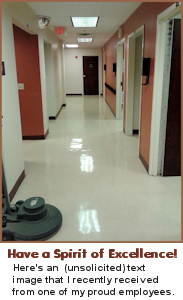Long story short:
After 25 years of hard work, determination, faith and years of trial and error developing a systematic bidding method for my own cleaning business, I ended up building (with an unbelievable team of programmers) the janitorial bidding software that I was searching for.. A proven systematic approach that has generated millions in sales. A system that works!
Long story long:
My name is Drake Thomas, I’ve been in the cleaning business over 24 years. I started out at age 19, supplementing the income from my full time job by cleaning my sister Linda’s house once a week (for $40 cash). It took me about two hours to clean, so I averaged about $20 an hour. I made 4 times the minimum wage rate at the time and she got a clean house for a week! That’s a win/win in my book!
I saw that there was good money in cleaning, but it wasn’t my dream job at the time; I had other life plans to pursue. Linda was already a very successful computer programmer, having graduated Valedictorian in high school and cum laude in college, and she urged me to get a degree as well. So, over the next five years, I worked in sales and went to college part time, receiving an AA degree in CIS, Computer Information Systems. The degree was good, I learned a lot about computers, but I never pursued that career path. But, I did meet my lovely wife Kristin there and we just celebrated our 19th wedding anniversary!
Just before I graduated college, an opportunity arose to take over a tiny floor care company (stripping, waxing and polishing floors). The owners, an older couple, were moving out of town in two months and would lose the handful of accounts that they had. I made them an offer of $5,780, (the total value of all their equipment if purchased new). The deal was that I would give them a deposit of $2,500 – (a credit union signature loan) – and work with them at night (for free) during a two month training period. The balance would be paid off in 6 monthly installments from my business profits. They happily agreed. So for a while, I worked a day job, attended college part time, and then stripped floors at night (sometimes until 5am). Then I got up at 7am to do it again. At the end of the two month training period, I quit my day job. I figured if I could sell for “them”, I could sell for myself. Initially, I only offered floor care, but I pretty quickly started bidding – and winning bids – for complete janitorial services.
This calculated risk paid off, but isn’t life full of risks? The fruit is at the end of the branches. During my career, I’ve read literally hundreds of books on business management, motivation, goal setting, systems, sales/marketing techniques, cash flow, customer retention, budgets, planning, cost cutting and the list goes on. But my number one book concerning business is the book of Proverbs. It has taught me more about business than any other by far. Things like “mere talk leads to poverty” (take action!), “all hard work returns a profit” (don’t be lazy!), and “seek wisdom more than choice gold or fine silver” (knowledge is power!).
Over the years, I’ve won hundreds and hundreds of bids for monthly janitorial service, floor waxing, carpet cleaning, pressure washing, specialty work and supply sales for Banks, Car Dealerships, Churches, Corporate Offices, Day Cares, Dentist Offices, Doctor’s offices, Hair Salons, Hospitals, Ice Cream Parlors, Law Firms, Medical Facilities, Pawn Shops, Property Management, Restaurants, Retail Stores, Schools, Veterinarians, and just about everything in between. What’s the secret you ask?… There is no secret! Just a quarter century of hard work, determination, faith and years of trial and error developing a systematic bidding method for my own cleaning business. A proven approach that has generated millions in sales. A system that works!
This bidding system is available to you now! Welcome to CleanGuidePro Janitorial Bidware, cleanlyrun.com! If you’re looking for the right janitorial bidding software to help you win more bids, you’ve found it. You can accurately bid on commercial and residential, monthly cleaning accounts, 13 specialty work tasks like floor stripping, carpet cleaning, pressure washing, tile &and grout cleaning, day porters, etc, commercial and residential construction cleanup, and much more!
Over three years of development has gone into the creation and development of this software. We just released in February of this year and hundreds of janitorial companies have already signed up, given us awesome feedback and most important, are winning bids! Not only is it designed to bid the way that I’ve bid and won hundreds and hundreds of times, but the behind the scenes team of software programmers have integrated the latest business rules technology to capture every nuance of successful bidding. This team is headed up by – you guessed it – none other than my sister Linda. Her thirty years of expertise and experience working on a multitude of Fortune 500 IT projects have made CleanGuidePro come to life. I half kiddingly tell people that I’m a Grand Master Janitor, but Linda is truly a Grand Master Programmer! Call it fate, destiny, or a match made in Heaven, but don’t call it coincidence. My love and gratitude to her.
Sign up today for our no obligation, free 30 day trial and start winning those bids! Check it out for yourself at cleanlyrun.com !
Sincerely,


![]()


 To acquire new customers, you spend a lot of time, effort and money to market and sell your services. Once you get a new customer, that’s just the beginning; Now you have to keep them!
To acquire new customers, you spend a lot of time, effort and money to market and sell your services. Once you get a new customer, that’s just the beginning; Now you have to keep them!